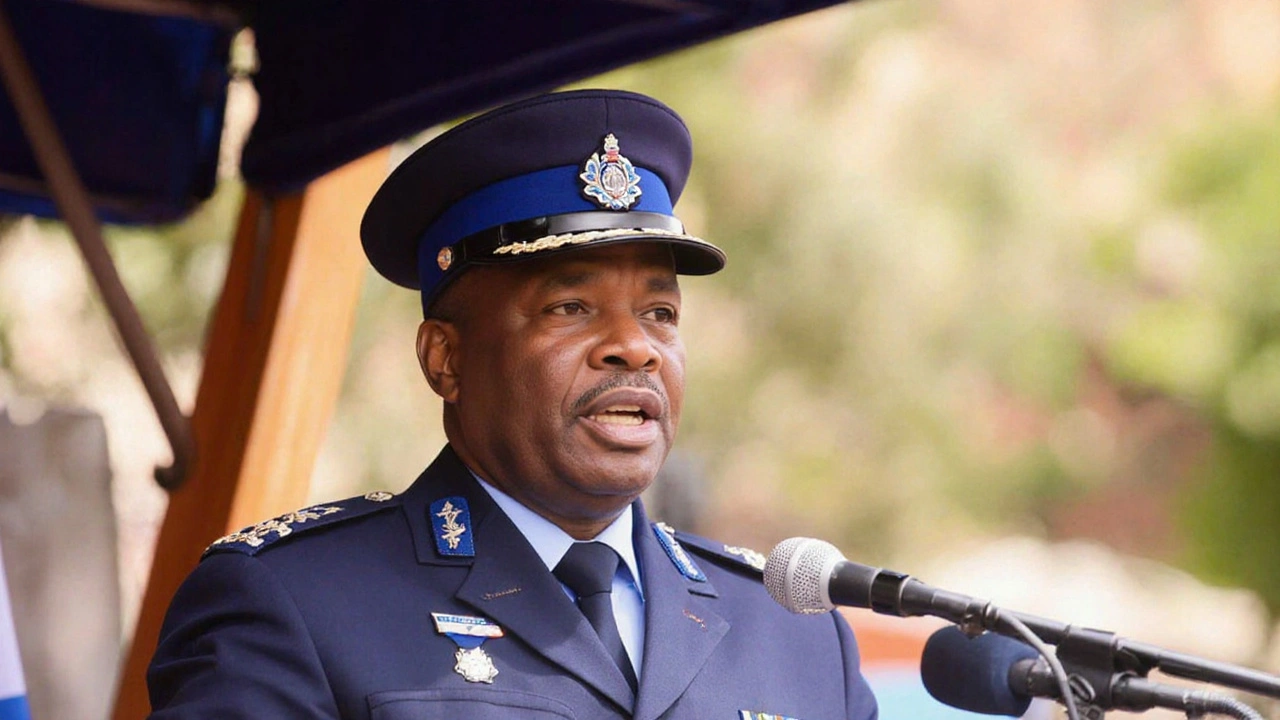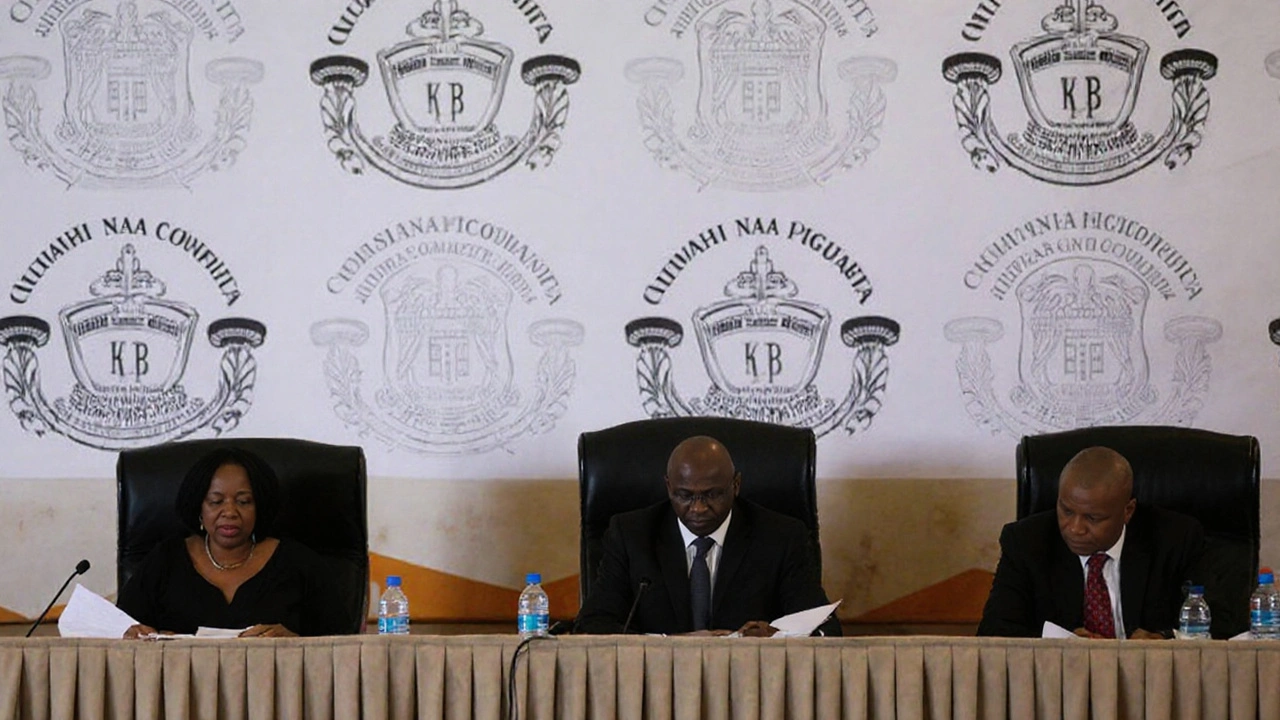On the second day of hearings at the Brigette Mabandla Justice College, KwaZulu‑Natal Police Commissioner Lieutenant General Nhlanhla Mkhwanazi took the stand before the Madlanga Commission to expand on allegations he first raised in July. His testimony aimed to map out a web of political interference, intelligence abuse, and systemic failures that he believes have eroded public confidence in South Africa’s criminal justice system.
Testimony uncovers alleged intelligence misuse
Mkhwanazi opened his statement by recalling a March 5, 2025 session before a parliamentary portfolio committee, where he, Minister Senzo Mchunu (now suspended), and other senior officials were asked to brief MPs on the Provincial KwaZulu‑Natal Task Team (PKTT). He said the committee’s questions hinted at a deeper agenda: some members appeared intent on steering the task team’s investigations toward politically sensitive cases.
According to the commissioner, three MPs – whose names he withheld pending formal processes – repeatedly asked for raw crime‑intelligence reports on ongoing investigations involving high‑profile businessmen linked to the ruling party. He claimed these requests went beyond routine oversight and amounted to an unlawful grab for operational data that could be weaponised in political battles.
- MP A allegedly sought details on a money‑laundering probe tied to a provincial construction contract.
- MP B asked for surveillance logs on a case involving a former mayor accused of graft.
- MP C requested the names of undercover officers assigned to monitor a whistle‑blower network.
Mkhwanazi stressed that such demands breached the Intelligence Services Act, which restricts dissemination of classified intelligence to authorised bodies only. He warned that the abuse “undermines the very purpose of intelligence work – to protect the nation, not to fuel partisan agendas.”
The commissioner also addressed the disbandment of the PKTT, which he said was ordered by senior political figures without a transparent rationale. He recounted that the task team had been pursuing several corruption cases involving senior officials, but the abrupt shutdown left key evidence unsecured and investigations stalled.

Implications for the Zondo Commission and wider reforms
In a surprising turn, Mkhwanazi revealed that despite his intimate knowledge of state‑capture dynamics, he was never summoned to testify before the Zondo Commission. He argued that omitting the police perspective deprived the inquiry of vital insights into how intelligence was manipulated at the highest levels.
He called for a formal review of how commissions of inquiry engage law‑enforcement leaders, noting that the failure to call him “sends a dangerous message about the marginalisation of policing voices in national accountability processes.”
The testimony also highlighted chronic coordination gaps between the South African Police Service, the National Prosecuting Authority (NPA), and specialised units such as the Directorate for Priority Crime Investigation (the Hawks). Mkhwanazi said that written protocols governing information sharing were either outdated or ignored, resulting in duplicated efforts and missed opportunities to prosecute high‑profile offenders.
National Police Commissioner General Fannie Masemola is slated to appear in upcoming hearings, which many observers expect will deepen the probe into the alleged collusion between politicians and intelligence officials. Civil‑society groups have welcomed Mkhwanazi’s candour, urging Parliament to act on his recommendations, which include:
- Establishing an independent oversight body for crime‑intelligence dissemination.
- Reinstating the PKTT with a clear, legislated mandate insulated from political interference.
- Mandating that all future commissions of inquiry formally invite senior police officials when their testimony is material to the investigation.
While the Madlanga Commission’s final report is still months away, Mkhwanazi’s day‑two testimony has already sparked heated debate on the bench of the Brigette Mabandla Justice College. Lawmakers, activists, and legal scholars are now watching closely to see whether the revelations will translate into concrete legislative reforms or fade into another chapter of South Africa’s long‑standing struggle with corruption and accountability.

Prince Raj
September 26, 2025 AT 15:02The procedural infrastructure of the Madlanga Commission appears to be compromised by what I’d term a systemic intel‑leakage syndrome; MPs are essentially weaponising raw crime‑intelligence to calibrate political leverage, which is a flagrant violation of the Intelligence Services Act and undermines operational integrity. This kind of data exfiltration erodes trust between law‑enforcement and legislative oversight, creating a feedback loop of mistrust and inefficiency. Moreover, the request for surveillance logs and undercover officer identities signals a covert attempt to politicise police assets. In my view, the strategic risk calculus is being short‑circuited by short‑term partisan gains, which is unacceptable in a democratic framework that relies on independent policing. The commission must institute a hardened data‑governance protocol, enforce compartmentalisation, and audit any intelligence dissemination to prevent further abuse.
Gopal Jaat
October 9, 2025 AT 09:30What a theatrical revelation! The drama of MPs scrambling for secret files reads like a courtroom thriller, yet the facts remain starkly plain: they overstepped. The commission's spotlight on these dubious requests underscores the urgent need for a clear demarcation between oversight and interference.
UJJAl GORAI
October 22, 2025 AT 03:58Ah, the lofty ideals of parliamentary scrutiny, now reduced to a petty game of cat‑and‑mouse with raw intel. One can't help but marvel at the sheer audacity of those gentlemen-MP A, B, C-who apparently think the law is a suggestion rather than a binding covenant. It's almost comedic, if it weren't so tragic, that they reach for classified dossiers as if rummaging through a communal fridge. Their motives? Likely a concoction of self‑interest, power‑hoarding, and perhaps a dash of sheer curiosity for the forbidden. The commission's testimony, while illuminating, merely scratches the surface of a deeper malaise: a systemic erosion of the principle that intelligence serves the nation, not partisan puppeteers. One must wonder whether the architects of this misuse envision a future where every political tussle is buttressed by clandestine data, turning democracy into a surveillance‑driven arena. Moreover, the omission of the police commissioner from the Zondo Commission feels like a deliberate blind‑spot, a calculated decision to keep the narrative neatly tidy. By sidelining the very custodians of intelligence, the inquiry forfeits a crucial perspective, rendering its conclusions potentially myopic. This selective hearing aligns with a pattern where key stakeholders are either sidelined or silenced, ensuring that the narrative remains amenable to the powers that be. In short, the whole affair is a cautionary tale about how power structures, when left unchecked, will inevitably co‑opt mechanisms designed for public safety. The path forward demands an independent oversight entity, insulated from political whims, to safeguard the sanctity of intelligence work. Until then, we risk watching the slow death of institutional integrity, one covert request at a time.
Satpal Singh
November 3, 2025 AT 21:25The commission's findings clearly highlight a breach of protocol. Respectful dialogue between Parliament and law‑enforcement is essential, and any deviation must be addressed promptly.
Devendra Pandey
November 16, 2025 AT 15:53While everyone applauds the exposé, I can't help but wonder if the narrative is being spun to create a scapegoat. Perhaps the real issue lies elsewhere.
manoj jadhav
November 29, 2025 AT 10:21It’s crucial, indeed, that we foster constructive engagement across all branches; this ensures that the intelligence apparatus remains robust, transparent, and accountable! By encouraging open dialogue, we can mitigate the risks of politicisation and reinforce public trust! Let’s remember that collaborative oversight, when executed responsibly, serves the greater good!.
saurav kumar
December 12, 2025 AT 04:48The key is clear: set up an independent body to manage intel sharing, and keep politics out of it.
Ashish Kumar
December 24, 2025 AT 23:16This is a disgraceful display of unchecked power.
Pinki Bhatia
January 6, 2026 AT 17:44I appreciate the commission shedding light on these issues. It’s important that we listen to all sides and strive for reforms that protect both security and democratic oversight.
NARESH KUMAR
January 19, 2026 AT 12:12Great points! 😊 Let’s hope the recommendations get the attention they deserve, and that future commissions involve all relevant voices.
Purna Chandra
February 1, 2026 AT 06:39Honestly, this whole setup reeks of a grand design to keep the masses blind. They’ll throw a commission in your face while pulling the strings behind the curtain. It’s classic – create a façade of accountability, then ensure the real power brokers stay untouched. The fact that the police chief was left out of the Zondo probe is no accident; it’s a calculated omission to keep the narrative clean. If you dig deeper, you’ll see a network of interests that thrive on this chaos. The only way out is total transparency, but that’s a pipe dream when the very institutions meant to enforce it are compromised.
Mohamed Rafi Mohamed Ansari
February 14, 2026 AT 01:07From a procedural standpoint, it would be advisable to institute a statutory framework that delineates the parameters for intelligence dissemination. Such a framework should incorporate mandatory audits, clear chains of command, and stringent penalties for non‑compliance. Implementing these measures would fortify institutional integrity and safeguard democratic oversight.